| Srl | Item |
| 1 |
ID:
073663


|
|
|
|
|
| Publication |
2006.
|
| Summary/Abstract |
Current tensions between the United States and Europe have raised questions about the future of the transatlantic relationship, though historical analysis suggests that the good old days were not perfect either. This article considers the history of U.S.-European relations and concludes that they have always been complex, as neither Americans nor Europeans have been sure how an integrated Europe would fit into an Atlantic partnership. It concludes that the future of the West depends on Europeans' developing on their own a clearer vision of the concrete shape and international role of the EU.
|
|
|
|
|
|
|
|
|
|
|
|
|
|
|
|
| 2 |
ID:
073657
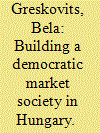

|
|
|
|
|
| Publication |
2006.
|
| Summary/Abstract |
Hungary's ability to become an internationally integrated democratic market society by 2000 was facilitated by its point of departure on this path: politically liberalized reform-socialism. But other factors were crucial as well, such as the lack of violence, the economic and political behavior of transformation's winners and losers, and eu policies. The high fiscal cost of Hungary's foreign-led modernization inevitably creates tensions, but unlike under communism, Hungarians now have a mechanism to express their concerns, by electing a new government. A trial-and-error pattern of political success has thus been established that is likely to remain an inherent feature of its politics.
|
|
|
|
|
|
|
|
|
|
|
|
|
|
|
|
| 3 |
ID:
073661
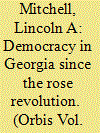

|
|
|
|
|
| Publication |
2006.
|
| Summary/Abstract |
Success for Georgia's nascent democracy would be a major success for the democracy-promotion efforts of the United States, which has hailed the democratization there since the Rose Revolution as a success even as concerns have been voiced by some observers regarding the pace and direction of this effort. The U.S. policy of unconditional support for Georgia's government and its disinterest in drawing attention to the new government's democratization shortcomings call into question how serious the United States is about democracy-promotion, particularly in countries that have a semi-democratic but pro-American government. A U.S. approach to Georgia that recognizes the challenges there and seeks to help it solve these problems will demonstrate that America is sincere in its desire to promote democracy, not just to support friendly governments.
|
|
|
|
|
|
|
|
|
|
|
|
|
|
|
|
| 4 |
ID:
073659
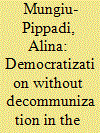

|
|
|
|
|
| Publication |
2006.
|
| Summary/Abstract |
Since recent U.S.-led democratization projects having led in some cases to the election of Islamist movements, the old democratic theory that structural preconditions are key determinants of successful democratization has apparently been bolstered. This article examines the democratization experience in postcommunist Europe to assess which matters more, a society's "givens" favoring democracy or the institutional imports that a democracy-minded elite can borrow. In particular, it compares the experience of the Southeast Europe countries, which presented poor prerequisites for successful democratization and yet in at least two cases (Romania and Bulgaria) are far along on the path to democratization to the experience of Central Europe and the former Soviet Union as a whole.
|
|
|
|
|
|
|
|
|
|
|
|
|
|
|
|
| 5 |
ID:
073664


|
|
|
| 6 |
ID:
073656
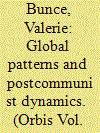

|
|
|
|
|
| Publication |
2006.
|
| Summary/Abstract |
Many of the new democracies that have been formed since the fall of the Soviet Union in 1991 lack what had long been understood as preconditions for the democratic project: an earlier history of democratic politics, high personal incomes, a large middle class, and/or settled borders. The most distinctive aspects of this wave of democratic transitions are rapid regime change and the rise of democracies that exhibit a mixture of both authoritarian and democratic elements. This article explores what these new democracies can teach us about the factors that seem to encourage a transition from dictatorship to democracy, and what factors seem to contribute to its sustainability and institutionalization.
|
|
|
|
|
|
|
|
|
|
|
|
|
|
|
|
| 7 |
ID:
073660


|
|
|
|
|
| Publication |
2006.
|
| Summary/Abstract |
The Rose Revolution opened a new chapter in the history of modern Georgia. The post-revolution government achieved a number of successes in areas such as dramatically increasing state budget revenues, fighting corruption, and setting up effective cooperative relationships with the international financial institutions. But it made some mistakes, too, in building a democratic state in general and in its economic policy in particular. Its relationship with Russia and its excessive exposure to Russian investments is particularly troubling. The country's policies need to be fine-tuned in order to protect its democracy and promote further economic growth.
|
|
|
|
|
|
|
|
|
|
|
|
|
|
|
|
| 8 |
ID:
073662


|
|
|
|
|
| Publication |
2006.
|
| Summary/Abstract |
Contrary to the increasingly popular image of Russia as an aggressive, imperialist state, the primary drivers in Russia's foreign policy are domestic. They include new economic confidence, new soft power, and remaining security vulnerabilities. In response to these conditions, Russia pursues opportunities for economic growth and stability, and it builds strategic alliances in the near and distant abroad in order to address increasing security threats. The often-used comparison of Russia's foreign policy assertiveness to the Soviet Cold War policy is inaccurate. A better parallel is to Russia's 1890s policy led by Finance Minister Sergei Witte: strong internal economic development through state-driven liberalization, while avoiding foreign policy adventures. The United States should follow a policy of pragmatic substantive engagement, rather than neo-containment, toward Russia.
|
|
|
|
|
|
|
|
|
|
|
|
|
|
|
|
| 9 |
ID:
073658


|
|
|
|
|
| Publication |
2006.
|
| Summary/Abstract |
Over the eight years beginning with the election of a reformist government in September 1998, Slovakia achieved a remarkable turnaround from reform laggard into one of the leaders among the postcommunist transitions of Central and Eastern Europe. This article examines the lessons learned from this successful transition, which demonstrates that quick and effective implementation of a cogent set of economic reforms can produce positive short-term economic results, with favorable and prompt political benefits. Foreign governments, multinational financial institutions, and nationals with technical training abroad who return home to serve in key positions can make a real difference.
|
|
|
|
|
|
|
|
|
|
|
|
|
|
|
|
| 10 |
ID:
073665
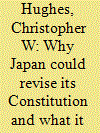

|
|
|
|
|
| Publication |
2006.
|
| Summary/Abstract |
This article seeks to make sense of the policy debate on constitutional revision underway in Japan, to consider what international and domestic factors are driving the debate forward, to assess the range of proposals currently on the table, and to gauge the likelihood of actual constitutional change. Additionally, it considers how various forms of constitutional revision, if actually implemented, might affect Japan's military doctrines and capabilities; the extent of its alliance cooperation with the United States; its devotion of military capabilities to un operations; and the repercussions for Japan's regional relations in East Asia.
|
|
|
|
|
|
|
|
|
|
|
|
|
|
|
|